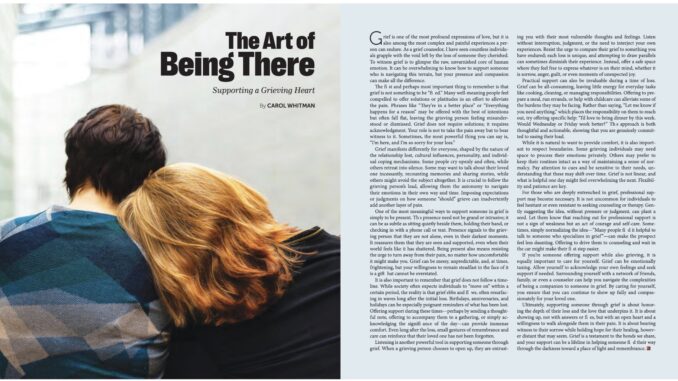
By Carol Whitman
Grief is one of the most profound expressions of love, but it is also among the most complex and painful experiences a person can endure. As a grief counselor, I have seen countless individuals grapple with the void left by the loss of someone they cherished. To witness grief is to glimpse the raw, unvarnished core of human emotion. It can be overwhelming to know how to support someone who is navigating this terrain, but your presence and compassion can make all the difference.
The first and perhaps most important thing to remember is that grief is not something to be “fixed.” Many well-meaning people feel compelled to offer solutions or platitudes in an effort to alleviate the pain. Phrases like “They’re in a better place” or “Everything happens for a reason” may be offered with the best of intentions, but often fall flat, leaving the grieving person feeling misunderstood or dismissed. Grief does not require solutions; it requires acknowledgment. Your role is not to take the pain away but to bear witness to it. Sometimes, the most powerful thing you can say is, “I’m here, and I’m so sorry for your loss.”
Grief manifests differently for everyone, shaped by the nature of the relationship lost, cultural influences, personality, and individual coping mechanisms. Some people cry openly and often, while others retreat into silence. Some may want to talk about their loved ones incessantly, recounting memories and sharing stories, while others might avoid the subject altogether. It is crucial to follow the grieving person’s lead, allowing them the autonomy to navigate their emotions in their own way and time. Imposing expectations or judgments on how someone “should” grieve can inadvertently add another layer of pain.
One of the most meaningful ways to support someone in grief is simply to be present. This presence need not be grand or intrusive; it can be as subtle as sitting quietly beside them, holding their hand, or checking in with a phone call or text. Presence signals to the grieving person that they are not alone, even in their darkest moments. It reassures them that they are seen and supported, even when the world feels like it has shattered. Being present also means resisting the urge to turn away from their pain, no matter how uncomfortable it might make you. Grief can be messy, unpredictable, and even frightening, but your willingness to remain steadfast in its midst is a gift that cannot be overstated.
It is also important to remember that grief does not follow a set timeline. While society often expects individuals to “move on” after a certain period, the reality is that grief ebbs and flows and can be just as long in waves long after the initial loss. Birthdays, anniversaries, and holidays can be especially poignant reminders of what has been lost. Offering support during these times—perhaps by sending a thoughtful note, offering to accompany them to a gathering, or simply acknowledging the significance of the day—can provide immense comfort. Even long after the loss, small gestures of remembrance and care can reinforce that their loved one has not been forgotten.
Listening is another powerful tool in supporting someone through grief. When a grieving person chooses to open up, they are entrusting you with their most vulnerable thoughts and feelings. Listen without interruption, judgment, or the need to redirect your own experiences. Resist the urge to compare their grief to something you have endured. Grief is so unique and specific, and platitudes are sometimes thin disguises for impatience. Instead, offer a safe space where they feel free to express whatever is on their mind, whether it is sorrow, anger, guilt, or even moments of unexpected joy.
Practical support can also be invaluable during a time of loss. Grief can be all-consuming, leaving little energy for everyday tasks like cooking, cleaning, or managing responsibilities. Offering to prepare a meal, run errands, or help with childcare can alleviate some of the burdens they may be facing. Rather than saying, “Let me know if you need anything,” which places the responsibility on the grieving individual, try offering specifics: “I’d love to bring dinner by this week. Would Wednesday or Friday work better?” This approach is both thoughtful and actionable, showing that you are genuinely committed to easing their load.
While it is natural to want to provide comfort, it is also important to respect boundaries. Some grieving individuals may need space to process their emotions in solitude, others may prefer to keep their routines intact as a way of maintaining a sense of normalcy. Pay attention to cues and be sensitive to their needs, understanding that these may shift over time. Grief is not linear, and what is helpful at one moment might be unhelpful the next. Flexibility and patience are key.
For those who are deeply entrenched in their grief, support may become necessary. It is not uncommon for individuals to benefit from speaking with a licensed counseling or therapist. Gently suggesting this option, when and if needed, can plant a seed. Let them know that reaching out for professional support is a strength, not a weakness—and of course, respect their comfort zone. In some, simpler acknowledgments—“Many people do find it helpful to talk to someone who specializes in grief”—can make the prospect less intimidating and easier to explore.
Grief is love with nowhere to go, and the people who walk with us through it—the ones who show up and stay—can help light the way through the darkness toward a place of light and remembrance.


